The childhood trampled by the war
According to well-known statistics, the Great Patriotic War claimed about 27 million citizens of the Soviet Union. Of these, about 10 million are soldiers, the rest are old men, women, children. But the statistics is silent about how many children died during the Great Patriotic War. There is simply no such data. The war crippled thousands of children's destinies, took away a bright and joyful childhood. The children of the war, as they could, brought the Victory closer to the best of their strength, albeit small, albeit weak. They drank grief with a full bowl, maybe too big for a little man, because the beginning of the war coincided for them with the beginning of life ... How many of them were hijacked in a foreign land ... How many were killed by the unborn ...
During the years of the Great Patriotic War, hundreds of thousands of boys and girls went to military registration and enlistment offices, added a year or two to themselves and left to defend their homeland, many died for it. Children of war often suffered from her no less than the fighters at the front. Early childhood trampled by war, suffering, hunger, and death made the children adults, nurturing their childlike spirit, courage, ability to self-sacrifice, to the feat in the name of the Motherland, in the name of Victory. Children fought on a par with adults and in the army and in partisan detachments. And these were not isolated cases. According to Soviet sources, there were dozens of thousands of such guys.
Here are the names of some of them: Volodya Kazmin, Yura Zhdanko, Lenya Golikov, Marat Kazei, Lara Mikheenko, Valya Kotik, Tanya Morozova, Vitya Korobkov, Zina Portnova. Many of them fought in such a way that they deserved military orders and medals, and four: Marat Kazei, Valya Kotik, Zina Portnova, Lenya Golikov, became Heroes of the Soviet Union. From the first days of the occupation, boys and girls began to act at their own peril, which was truly fatal.
The guys collected the remaining rifles from the battles, ammunition, machine guns, grenades, and then passed all this to the partisans, of course, they seriously risked. Many schoolchildren, again at their own peril and risk, conducted reconnaissance, were coherent in partisan detachments. They saved the wounded Red Army soldiers, helped the underground workers to arrange the escapes of our prisoners of war from German concentration camps. They burned German warehouses with food, equipment, uniforms, fodder, blew up railway cars and locomotives. On the "children's front" fought both boys and girls. It was especially massive in Belarus.
In units and subunits at the front, adolescents 13-15 often fought with fighters and commanders for years. These were mostly children who lost their parents, most of them killed or driven by Germans to Germany. Children who remained in the destroyed cities and villages became homeless, doomed to starvation. It was terrible and difficult to stay in the territory occupied by the enemy. Children could be sent to a concentration camp, taken to work in Germany, turned into slaves, made donors for German soldiers, etc.
In addition, the Germans in the rear were not at all embarrassed, and they brutally dealt with the children. "... Often, because of entertainment, a group of Germans on holiday arranged a breakdown: they threw a piece of bread, the children ran to him, and after them the automatic bursts. How many children died because of such amusements of the Germans all over the country! Children who were swollen from hunger could something to take, without any sense, edible from the German, and then it’s the turn from the machine. And the child has eaten forever! " (Solokhina N.Ya., Kaluga Region, Lyudinovo, from the article “We are not from childhood”, “The World News", No. 27, 2010, p. 26).
Therefore, the Red Army units passing through these places were sensitive to such guys and often took them with them. The sons of the regiments - the children of the war years fought against the German occupiers on a par with adults. Marshal Baghramyan recalled that the courage, bravery of teenagers, their ingenuity in fulfilling missions amazed even old and experienced soldiers.
"Fedya Samodurov. Fedo 14 years, he was a graduate of a motorized rifle unit commanded by guard captain A. Chernavin. Fedya was picked up in his homeland, in a destroyed village in the Voronezh region. Together with a part he participated in the battles for Ternopil, with machine-gunners he kicked Germans out of the city When almost the whole calculation died, the teenager, along with the surviving fighter, took up the machine gun, firing back and forth for a long time, and detained the enemy. Fedya was awarded the medal "For Courage".
Vanya Kozlov. Van 13 years, he was left without relatives and the second year is in the motorized rifle unit. At the front, he delivers food, newspapers and letters to fighters in the most difficult conditions.
Petya Tooth. Petya Zub chose an equally difficult specialty. He long ago decided to become a scout. His parents were killed, and he knows how to settle accounts with the damned German. Together with experienced scouts, he gets to the enemy, reports his location on the radio, and, according to their orders, artillery fires, crushing the fascists. "(Arguments and Facts, No. XXUMX, 25, p. 2010).
Pupil of the 63rd Guards tank brigade Anatoly Yakushin received the Order of the Red Star for saving the life of the brigade commander. There are many examples of the heroic behavior of children and adolescents at the front ...
There were a lot of such guys during the war and a lot of them went missing. In the story of Vladimir Bogomolov "Ivan" you can read about the fate of the young intelligence officer. Vanya was from Gomel. During the war, his father and sister were killed. The boy had to go through a lot: he was in the partisans and in Trostyants, in the death camp. Mass executions, ill-treatment of the population caused a great desire in children to take revenge. Getting into the Gestapo, adolescents showed amazing courage and resilience. Here is how the author describes the death of the hero of the story: "... December 21 in the 23 Army Corps location, in the restricted area near the railway, by the rank of auxiliary police Yefim Titkov was seen and, after two hours of observation, a Russian student of 10 - 12 years was detained lying in the snow and watching the movement of trains on the Kalinkovichi-Klinsky section ... During interrogations, he held himself defiantly: he did not hide his hostility towards the German army and the German Empire. In accordance with the directive of the High Command, E forces from November 11 1942 25.12.43 was shot, in 6.55 ".
The girls also actively participated in the underground and partisan struggle in the occupied territory. Fifteen-year-old Zina Portnova came from Leningrad to relatives in 1941 for a summer vacation in the village of Zui, Vitebsk region. During the war, she became an active participant in the Obolskaya anti-fascist underground youth organization Young Avengers. Working in the canteen of the retraining courses for German officers, poisoned food, as directed by the underground. Participated in other sabotage, distributed leaflets among the population, on the instructions of the partisan detachment conducted intelligence. In December 1943, returning from the assignment, she was arrested in the village of Mostishche and identified as a traitor. At one of the interrogations, grabbing the investigator’s gun from the table, shot him and two other Nazis, tried to escape, but was captured, brutally tortured, and shot on January 13, 1944 in the prison of Polotsk.
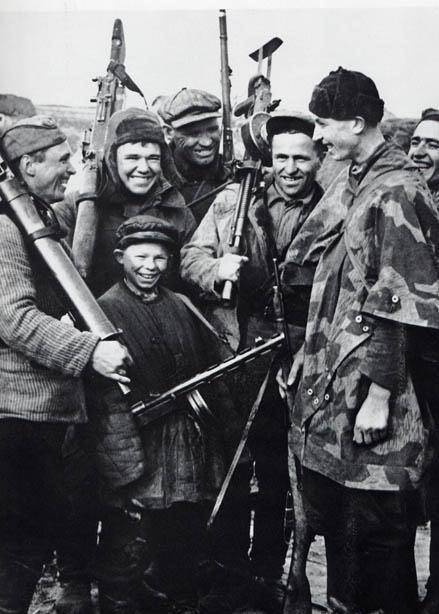
A sixteen-year-old schoolgirl Olya Demesh with her younger sister Lida at the Orsha station in Belarus on the instructions of the commander of the partisan brigade S. Zhulina was blown up with a magnetic mine of a fuel tank. Of course, girls attracted much less attention from the German guards and policemen than teenage boys or adult men. But after all, the girls fit into the dolls to play, and they fought with the soldiers of the Wehrmacht!
Thirteen-year-old Lida often took a basket or bag and went to the railway to collect coal, extracting intelligence about the German military echelons. If the guards stopped her, she explained that she was collecting coal to heat the room in which the Germans live. The mother of Olya and the younger sister Lida were captured and shot by the fascists, and Olya continued to carry out the partisan tasks fearlessly. For the head of the young partisan Oli Demesh, the fascists promised a generous reward — land, a cow, and 10 thousands of marks. Copies of her photos were distributed and sent to all patrol services, policemen, wardens and undercover agents. Capture and deliver it alive - that was the order! But to catch the girl failed. Olga destroyed 20 German soldiers and officers, derailed 7 enemy echelons, led reconnaissance, participated in the "rail war", in the destruction of German punitive units.
From the first days of the war, children had a great desire to help the front at least something. In the rear, children did their best to help adults in all matters: they participated in the air defense — they were on duty on the roofs of houses during enemy raids, built defensive fortifications, collected black and colored scrap metal, medicinal plants, participated in collecting things for the Red Army, worked on Sunday schools .
The guys worked day and night in factories, factories and production, standing up for machines instead of brothers and fathers who went to the front. Children also worked in defense enterprises: they made fuses to mines, fuses to hand grenades, smoke bombs, colored signal flares, collected gas masks. Worked in agriculture, grew vegetables for hospitals. In the school sewing workshops pioneers sewed linen for the army, tunics. The girls knitted warm clothes for the front: mittens, socks, scarves, sewed tobacco pouches. The guys helped the wounded in the hospitals, wrote letters to their relatives, dictating letters, staging performances for the wounded, and giving concerts, causing a smile from adult men exhausted by the war. On one such concert there is a touching poem by E. Yevtushenko:
"The ward turned off the radio ...
And someone stroked my heel.
In the Zima hospital wounded
Our children's choir gave a concert ... "
In the meantime, hunger, cold, illnesses in two bills dealt with fragile little lives.
A number of objective reasons: the departure of teachers to the army, the evacuation of the population from the western to the eastern regions, the inclusion of students in labor activities in connection with the departure of family breadwinners to the war, the transfer of many schools to hospitals, etc., prevented the deployment of universal seven-year compulsory education in the USSR learning started in 30-s. In the remaining educational institutions, training was conducted in two, three, and sometimes four shifts. At the same time, the children themselves had to store firewood for the boiler houses. There were no textbooks, but due to the lack of paper they wrote on old newspapers between the lines. Nevertheless, new schools were opened, additional classes were created. Boarding schools were created for evacuated children. For the youth who left school at the beginning of the war and were employed in industry or agriculture, in 1943, schools for working and rural youth were organized.
In the annals of the Great Patriotic War there are still a lot of little-known pages, for example, the fate of kindergartens. “It turns out that in December 1941 was working kindergartens in besieged Moscow in bomb shelters. When the enemy was thrown back, they resumed their work faster than many universities. By the autumn of 1942, 258 kindergartens opened in Moscow!
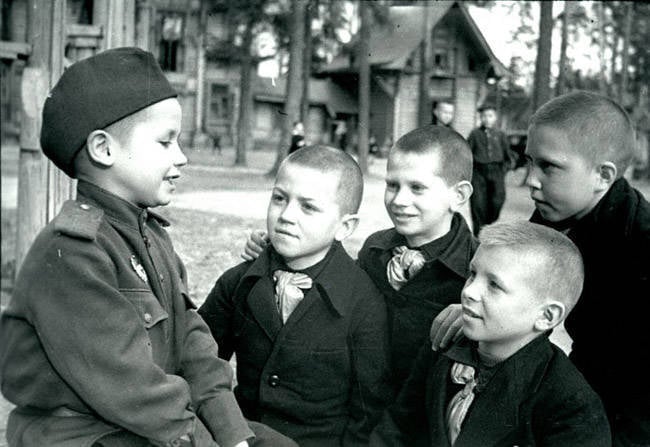
More than five hundred tutors and nannies in the autumn of 1941 th dug trenches on the outskirts of the capital. Hundreds worked on logging. The teachers, who yesterday led the children in a round dance, fought in the Moscow militia. Under Mozhaisk, the teacher of the kindergarten of the Baumansky district, Natasha Yanovskaya, died heroically. The educators who remained with the children did not perform any exploits. They simply rescued the little ones whose fathers fought and their mothers stood at the bench. Most kindergartens became boarding schools during the war, children stayed there day and night. And in order to feed the children in a half-starved time, to protect them from the cold, to give them at least a little comfort, to occupy them for the benefit of the mind and soul - such work required a great love for children, deep decency and endless patience. "(D. Shevarov" World of News ", No. 27, 2010, p. 27).
"Play children
Grow free!
You are red
Childhood is given ", - Nekrasov wrote NA, but the war deprived the kindergarteners of the “red childhood”. Soonly these little kids also matured, quickly forgotten how to play pranks and act up. Convalescent fighters came to hospitals for children in kindergartens. The wounded soldiers long applauded the little artists, smiling through tears ... The warmth of the children's holiday warmed the wounded souls of the war veterans, reminded about the house, helped to return from the war unharmed. The children from kindergartens and their teachers also wrote letters to the soldiers on the front, sent drawings and gifts.
The children have changed the game, there was "a new game - in the hospital. They played the hospital before, but not so. Now the wounded are real people for them. But they play less frequently in the war, because no one wants to be a fascist. This role they are carried out by trees. They shoot snowballs. They have learned to help the injured - fallen, hurt. " From the boy's letter to the front-line soldier: “We used to play war too often, and now much less often - we’re sick of the war, rather, it would end so that we could live well again ...” (ibid.).
In connection with the death of parents in the country, many street children have appeared. The Soviet state, despite the difficult wartime, still fulfilled its obligations to children left without parents. To combat child neglect, a network of children's receivers and orphanages was organized and opened, employment of adolescents was organized. Many families of Soviet citizens began to take in orphans, where they found new parents. Unfortunately, not all educators and leaders of children's institutions were distinguished by honesty and decency. Here are some examples.
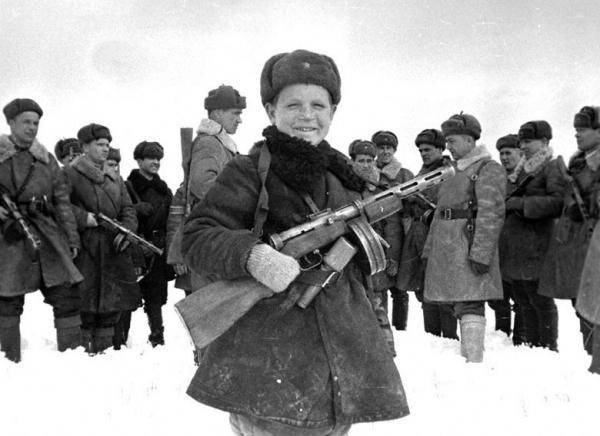
“In the autumn of 1942, children in tattered children who were stealing potatoes and grain from collective farm fields were caught in the Pochinkovsky district of the Gorky region. It turned out that the children of the regional orphanage were“ harvesting ”. And they did not do it from a good life. investigations, local policemen uncovered a criminal group, and, in fact, a gang consisting of employees of this institution. In total, seven people were arrested, including the director of the orphanage Novoseltsev, the accountant Sdobnov, the storekeeper Mukhina and others Itza. During the searches they 14 children's coats, seven suits have been withdrawn, 30 meters of cloth, 350 meters manufactory and other unlawful appropriation of property, with great difficulty, allocated by the state in this harsh wartime.
The investigation found that, by not giving up the relying norm of bread and food, the indicated criminals stole seven tons of bread, half a ton of meat, 1942 kg of sugar, 380 kg of cookies, 180 kg of fish, 106 kg of honey, etc., only during 121. Employees of the orphanage sold all these scarce products on the market or simply eaten themselves. Only one comrade Novoseltsev daily received fifteen servings of breakfast and lunch for himself and his family members. At the expense of the pupils, the rest of the staff also ate well. The children were fed with “dishes” made from rotten vegetables and vegetables, referring to the poor supply. For the entire 1942, they were given only one candy each time for the 25 anniversary of the October Revolution ... And what is most surprising, the director of the orphanage Novoseltsev in the same 1942 received an honorary certificate from the People's Commissariat of Education for excellent educational work. All these fascists were deservedly sentenced to long terms of imprisonment. "(M. Zefirov, D. Dektyarev," Everything for the front? How victory was forged, "p. 388-391).
"Similar cases of crimes and non-performance by pedagogical workers of their duties were revealed in other regions. So, in November 1942, a special report was sent to the Saratov City Defense Committee about the difficult living conditions of children living in orphanages ... Boarding schools are poorly heated or are without fuel , children are not provided with warm clothes and shoes, as a result of non-observance of the elementary social and hygienic rules, infectious diseases are observed. on some days, children did not receive bread at all, as if they lived not in the rear area of the Saratov region, but in besieged Leningrad. Studying due to the lack of teachers and lack of premises was abandoned long ago. In boarding schools in the Rovno region, in the village of Volkov and others, the children also did not receive bread at all for several days. " (Ibid. 391-392).
"Oh, the war, what did you do, mean ..." Over the long four years that the Great Patriotic War lasted, children, from toddlers to senior schoolchildren, experienced all its terrors in full. War every day, every second, every dream, and so on for nearly four years. But the war is hundreds of times worse, if you see it with children's eyes ... And no time can cure war wounds, especially children’s. "These years that were once, the bitterness of childhood does not forget ..."
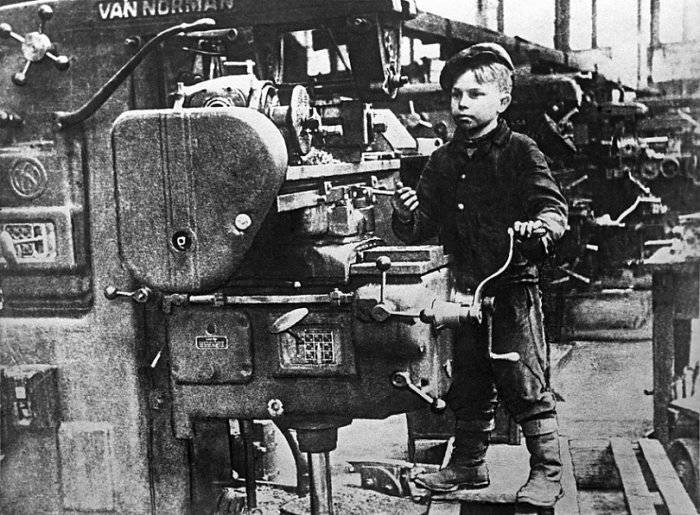
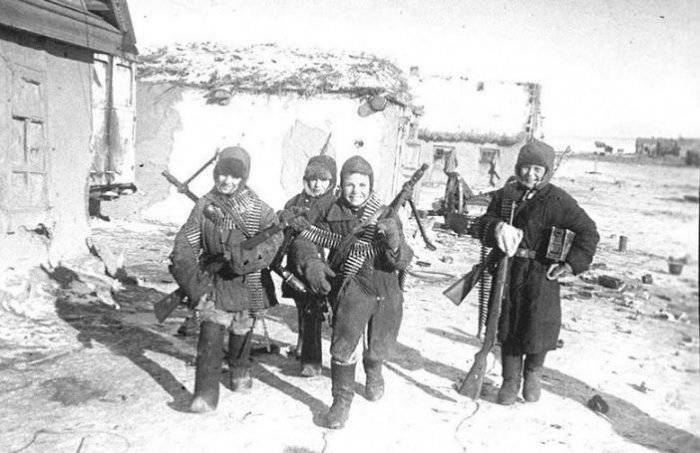
Information